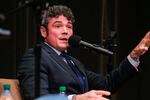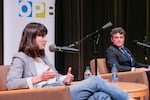
Joe Kent, the Republican candidate in Washington state's 3rd Congressional District race, speaks at a debate moderated by OPB "Think Out Loud" host Dave Miller on Oct. 27, 2022.
Sheraz Sadiq / OPB
One night a week before the election, Republican congressional candidate Joe Kent held a quiet forum at the Clark County Republican Party headquarters. After rattling off his platform for half an hour, he opened the floor to questions.
The questions, from a room of about two dozen people, varied. Would Kent really support impeaching Joe Biden and Kamala Harris, one person asked. Another, concerned with rumors of voter fraud, asked how to securely cast their ballot.
But one question never arose: Who pays Kent’s salary?
It’s a question that emerged only recently — late in the political season — with Washington’s 3rd Congressional District seat up for grabs for the first time since 2010.
The Daily Beast on Oct. 24 first reported it could not find records of Kent’s employer anywhere in the United States. Then, in an interview with OPB, Kent’s ex-campaign manager called Kent’s work a “phantom job” to help him run for Congress.
In response, Kent’s campaign said they misidentified his employer on federal filings. And the campaign dismissed the former manager as disgruntled by his firing late last year.
Yet Kent’s critics and his Democratic opponent seized the issue. At a late October debate in Longview, candidate Marie Gluesenkamp Perez piggybacked a question from the audience to suggest Kent is being paid a six-figure salary to run for office, which would be a federal crime.
“The question is: Who is paying you to run and defeat Jaime Herrera Beutler, and to defeat me?” Gluesenkamp Perez asked Kent in front of a crowd.
Gluesenkamp Perez’s supporters have shaded Kent as either dishonest or a political pawn. Meanwhile, her campaign is actively trying to court independents and moderate Republicans.
Late last week, one of her boosters filed federal complaints seeking an investigation into Kent’s work history. Her campaign then announced the complaints with a press release.
Despite those efforts, political experts say it’s unlikely the sudden questions will win over new voters. The climate today is so polarized, they said, that voters often use their candidate to adjust their views on issues, rather than the other way around.
Who pays?
To critics, Kent has underexplained his work history. And attempts by his campaign to explain his work story have raised more questions, they contend.
Camas-based investor David Nierenberg, who supported the district’s outgoing Republican Rep. Jaime Herrera Beutler for years and now supports Gluesenkamp Perez, has filed letters seeking federal investigations into Kent’s work history.

Marie Gluesenkamp Perez, the Democratic candidate in Washington state's 3rd Congressional District race, speaks at a debate moderated by OPB "Think Out Loud" host Dave Miller.
Sheraz Sadiq / OPB
In letters to the Federal Elections Commission and to ethics entities at the U.S. House of Representatives, Nierenberg wrote that Kent’s work raises questions about possible “large-scale unreported contributions” to his campaign.
“There are so many questions out there,” Nierenberg told OPB. “It’s astonishing.”
Much of the concern stems from Kent and his campaign misidentifying his employer, a Virginia-based company called Advanced Enterprise Solutions. It may also stem, in part, from Kent’s background with the Central Intelligence Agency.
On financial disclosures to the U.S. House, Kent’s campaign listed his employer as “American Enterprise Solutions.” The campaign made the same mistake on more than 30 political donations in 2020 and 2021, records show.
Matt Braynard, Kent’s senior policy advisor, told OPB it was his fault the federal filings misstated the company. On the donations, he speculated it was partly a typo and partly a technical glitch.
Kent had also misidentified his employer as “American Enterprise Solutions” at in-person events on the campaign trail. Kent has said he “screwed up” when he called the company the wrong name.
Those misstatements factored into Nierenberg’s complaints, he said.
“I’ve been receiving paychecks since 1965. I always knew who they came from,” Nierenberg said. “I just don’t know what to think.”
Before entering politics, Kent spent two decades as a Green Beret and worked briefly for the CIA. He planned a career “in the shadows,” as he described it, until his U.S. Navy Cryptologist wife died in a suicide bombing in 2019.
Kent joined Advanced Enterprise Solutions later that year, he said, after a mutual friend introduced him to CEO Sean Reed.
According to Kent, his job as project manager entails hiring people in foreign countries to help overseas governments and companies upgrade 5G infrastructure. He said his hours are flexible, but insisted he works full-time.
Kent calls his work history a nonissue. He told a crowd in Longview that he believes “our resumes very very much do matter” but described it as clerical error. He also blamed The Daily Beast for asking questions, which he called an attempt to “dox” his employer.
Byron Sanford, Kent’s former campaign manager, has publicly cast doubt. He said he never saw Kent work beyond campaigning, which entailed crisscrossing Southwest Washington for events and appearing on conservative outlets like Tucker Carlson’s FOX News show and Steve Bannon’s “War Room” podcast.
Sanford, who was fired by the campaign in 2021, said he believed Kent was being paid to run for office.
The Kent campaign and Advanced Enterprise Solutions refute the claim. Advanced Enterprise Solutions said via a Washington, D.C., public relations firm that it has “provided no support to Mr. Kent’s campaign,” The Daily Beast reported.
Reed has donated to Kent’s campaign as a private individual, filings show.
Amid scrutiny into his work, Kent recently released snippets of his W-2s and three years’ worth of tax returns. The documents show his employer is linked to another firm, Continuity Global Solutions, through his 401(k).
Federal databases show Continuity Global Solutions contracts heavily with the federal government and has been awarded contracts for services such as providing security to military bases in the United States and overseas.
It’s unclear if Kent’s work with Advanced Enterprise Solutions has had him do work with Global Continuity Solutions. His campaign did not respond to questions about the relationship.
Last-minute questions
While Kent’s critics and political opponents have hoped such questions could become political poison, it appears more likely it will become another example of how polarized voters are.
Kent has remained curt about his work history. Likewise, his supporters haven’t wavered. At the Longview debate, Kent contended that his work history hasn’t come up in any of his campaign events.

Congressional candidate Joe Kent speaks to a crowd of volunteers in Kalama, Wash., in September. Kent, a career soldier and Gold Star husband, has sought out the most conservative wings of Southwest Washington voters.
Troy Brynelson / OPB
Kent told the audience member who raised the question: “No one from the district, with the exception of you, has asked me about this.”
Indeed, at multiple political events following the reports, Kent’s supporters have largely ignored concerns of the candidate’s work history. Some view it as none of the public’s business, while others retort that other politicians are not forthcoming about how they make money.
At one town hall in Camas, an attendee apologized to Kent in front of the crowd that he had to undergo scrutiny. After another in Vancouver, truck driver Tom Garcia told OPB that he felt Kent did nothing out of the ordinary for politicians.
“Just like the other politicians. No one knows what they’re doing,” Garcia said. “I don’t see him doing anything wrong. I see him doing nothing but good for the people.”
Some hadn’t paid attention to the questions of Kent’s work history. Stephanie Dedmore, of Clark County, said after the meeting that she wasn’t aware, but reiterated that it didn’t affect how she viewed Kent because she preferred his policies on the economy.
“It’s not my top concern,” Dedmore said. “The military service was more important to me than work history.”
The divide doesn’t surprise political experts in the Pacific Northwest, who largely declined to talk about how Kent’s resume might impact the race, but spoke generally about polarization in the recent political climate.
Mark Stephan, a Washington State University Vancouver political science professor, said the questions largely bubbled up too late to be of any real consequence to many voters. He said voters are already locked in on their choices.
“It would have had to start a month ago — not in the last week,” Stephan said. “It would have had to have time to build into something that’s bothersome or strange.”
Even if the insinuations had arose earlier, it’s harder today to convince voters to rethink their chosen candidate. University of Oregon political science professor Neil O’Brian said polarization has been rising rapidly in recent years.
“One great example is split-ticket voters, who will vote for a Republican president and then a Democratic member of Congress, or vice versa,” O’Brian said. “That number has absolutely plummeted.”
One example is COVID-19, O’Brian said, a rare public health crisis that largely had no impact on then-President Donald Trump’s popularity among his base supporters. People tend to alter how they view an issue based on their candidate, but not vice versa.
“People’s perceptions of crises ... are colored by who they support, rather than something happening that shapes their preferences,” O’Brian said.